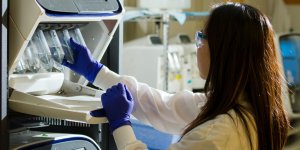Health News

A study led by University of Hawai‘i at Mānoa researchers has revealed that diversity in Hawaiian corals is likely driven by co-evolution among the coral host, its algal symbiont and the microbial community. »

Mothers can pass on allergies to offspring while they are developing in the womb and that is one reason why babies exhibit allergies early in life, according to a Singapore preclinical study. »

National Institutes of Health researchers have discovered a gene in mice that controls the craving for fatty and sugary foods and the desire to exercise. »

The body's immune system defeats diseases by sensing foreign invaders, such as bacteria or viruses, then mounting a response against them. »

A new study suggests that it is possible to design drugs that can target a type of shape-shifting protein involved in Alzheimer’s disease, which was previously thought to be undruggable. »

Macrophages, cells that help engulf and destroy harmful organisms in the body, tend to be characterized as the Jekyll and Hydes of the immune system. »

Gold nanotubes could be used to treat mesothelioma, a type of cancer caused by exposure to asbestos, according to a team of researchers at the Universities of Cambridge and Leeds. »

The brain is uniquely protected against invading bacteria and viruses, but its defence mechanism has long remained a mystery. Now, a study in mice, confirmed in human samples, has shown that the brain has a surprising ally in its protection: the gut. »

Scientists have used genome sequencing to reveal the extent to which a drug-resistant gastrointestinal bacterium can spread within a hospital, highlighting the challenge hospitals face in controlling infections. »

Over-activity in a single brain region called the subgenual anterior cingulate cortex (sgACC) underlies several key symptoms of mood and anxiety disorders, but an antidepressant only successfully treats some of the symptoms. »

Researchers at the National Institutes of Health have discovered a biological pathway that the novel coronavirus appears to use to hijack and exit cells as it spreads through the body. »

A National Institutes of Health study of 5,000 women has found that approximately 1 in 4 experienced high levels of depressive symptoms at some point in the three years after giving birth. »

Scientists have discovered a way to help heart cells recover after a heart attack. »

In a study researchers discovered that a gene, called PIEZO2, may be responsible for the powerful urge to urinate that we normally feel several times a day. »

Technique examines hundreds of compounds to find drugs that improve health and lengthen life. »

Evidence of tiny particles from air pollution has been discovered in the brain stems of children and young adults. »

One of the latest methods pioneered by scientists to treat cancer uses a Trojan horse sneak attack to prompt cancer cells to self-destruct – all without using any drugs. »

New findings by scientists at the National Institutes of Health and their collaborators help explain why some people with COVID-19 develop severe disease. »

A tiny capsule made from seaweed and packed with stem cells is being tested as a treatment for heart attack patients. »

An experimental treatment for eczema that aims to modify the skin microbiome safely reduced disease severity and increased quality of life for children as young as 3 years of age. »

DNA from tissue biopsies taken from patients with Barrett’s oesophagus – a risk factor for oesophageal cancer – could show which patients are most likely to develop the disease eight years before diagnosis, suggests a study. »

An international team of scientists has identified a novel association between the gene FAF2 and a reduced risk for alcohol-associated liver cirrhosis (ALC) in people who drink heavily. »

A man with 40inch (103cm) waist or above has a 35 per cent higher risk of dying from prostate cancer than one who wears a 35inch (90cm) or lower trouser size. »

Researchers identified sites of methylation that could not be found with existing sequencing methods. »

Findings offer hope for the Tasmanian devil, at the brink of extinction. »

Researchers have identified the optimal dish positions to help “nudge” diners into picking more planet-friendly meals in cafeterias. »

New research delineates how two relatively common variations in a gene called KIF3A are responsible for an impaired skin barrier (...) »

A new study has documented contamination of the environment and air near patients with COVID-19. »

Sleep paralysis – a condition thought to explain a number of mysterious experiences (...) »

Children wearing multifocal contact lenses had slower progression of their myopia, according to results from a clinical trial. »

A new research shows the way that cells in the body interact with each other during their own 24-hour clock and how it plays a critical role in the health of a person's metabolism. »

Researchers have found that a common plant owes the dazzling blue colour of its fruit to fat in its cellular structure. »

Four stranded DNA structures have been shown to play a role in certain types of breast cancer for the first time, providing a potential new target for personalised medicine. »

A ‘pill on a string’ test can identify ten times more people with Barrett’s oesophagus than the usual GP route. »

Identifying a master aging circuit allows biologists to genetically engineer prolonged life. »

A team of scientists from Andalusia has studied the effect of radiation on cancer stem cells (CSCs) and the CSC microenvironment in both in vitro and in vivo models. »

For every cell in the body there comes a time when it must decide what it wants to do for the rest of its life. »

Plant-based proteins will not boost muscle health as much as eating meat as we get older, a study suggests. »

Neuroscientists examine the way brain regions function independently and collectively. »

A study from the National Institutes of Health confirms that neurofilament light chain as a blood biomarker can detect brain injury (...) »

Exposure to iodine used for medical procedures in a neonatal intensive care unit may increase an infant’s risk for congenital hypothyroidism. »

Microbiome in Antarctic marine invertebrate may hold key to anticancer compound. »

An international team of scientists has developed a new nanoparticle-based artificial retina prosthesis that can be injected into the eye. »

Unprecedented details of enamel structure may point to new ways to prevent or halt cavities. »

Naked mole-rats can live for an incredibly long time and have an exceptional resistance to cancer thanks to unique conditions in their bodies that stop cancer cells multiplying, according to new research. »

Women who experience high blood pressure during pregnancy are more likely to develop heart disease and heart failure in later life, according to an international team of researchers. »

Children whose fathers make time to play with them from a very young age may find it easier to control their behaviour and emotions as they grow up, research suggests. »

Analysis of genetic variation has uncovered 230,000 differences in DNA among varieties. »

Combining more healthy lifestyle behaviors was associated with substantially lower risk for Alzheimer’s disease. »

Study shows treatment does no harm, but provides no benefit. »
